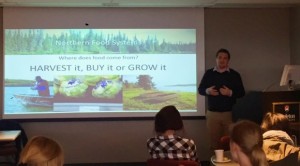Irena Knezevic with contributions from Peter Andrée
Photo credit: Maranda Grant
For most of us who think about the food system, the link between food and climate change seems obvious. Figuring out exactly what that relationship is can be more blurry. Carleton Climate Commons hosted a roundtable on this topic on March 17th which was attended by more than 50 students, faculty and community members. Andrew Spring from Wilfrid Laurier University and Dr. Sonia Wesche from the University of Ottawa opened up the discussion with vivid accounts of how climate change affects food systems in Canada’s North. From melting permafrost to increasingly unreliable ice-roads, to changing flora and fauna, they established a clear link between climate change and one of Canada’s most pressing challenges – food insecurity in the North. Though their accounts were mostly grim, they also offered hope through showcasing initiatives like the Northern Farm Training Institute in Hay River, community gardens, and substitutions strategies where communities are moving to eating wild game that is more abundant now as caribou herds continue to decline. Dr. Leah Temper from Seeds of Survival (USC Canada) brought an international perspective to the discussion by describing the international programs focused on seed security and diversification. She offered an optimistic account of how seed saving and sharing can not only facilitate adaptation to climate change, but also support small-scale farmers who are struggling to survive in the globalized food system.
Carleton University’s Dr. Peter Andrée acted as a respondent and provided an insightful commentary reminding the audience that we need to consider these issues in the wider context of how the global food system contributes to climate change, through monoculture-heavy agriculture, industrial meat production, and monumental food waste. Dr. Andrée noted some key themes across the three presentations, including the centrality of issues of social justice, the links between realizing food security and food sovereignty, and the need for climate change adaptation processes to be based in the participation of those communities and individuals most severely affected. The general discussion that followed engaged the audience in an exploration of how we can contribute to addressing climate change and food problems through both individual and collective action. By bringing together speakers from three universities and one organization, as well as diverse audience, Carleton Climate Commons offered a space for learning, dialogue and hope for action.

